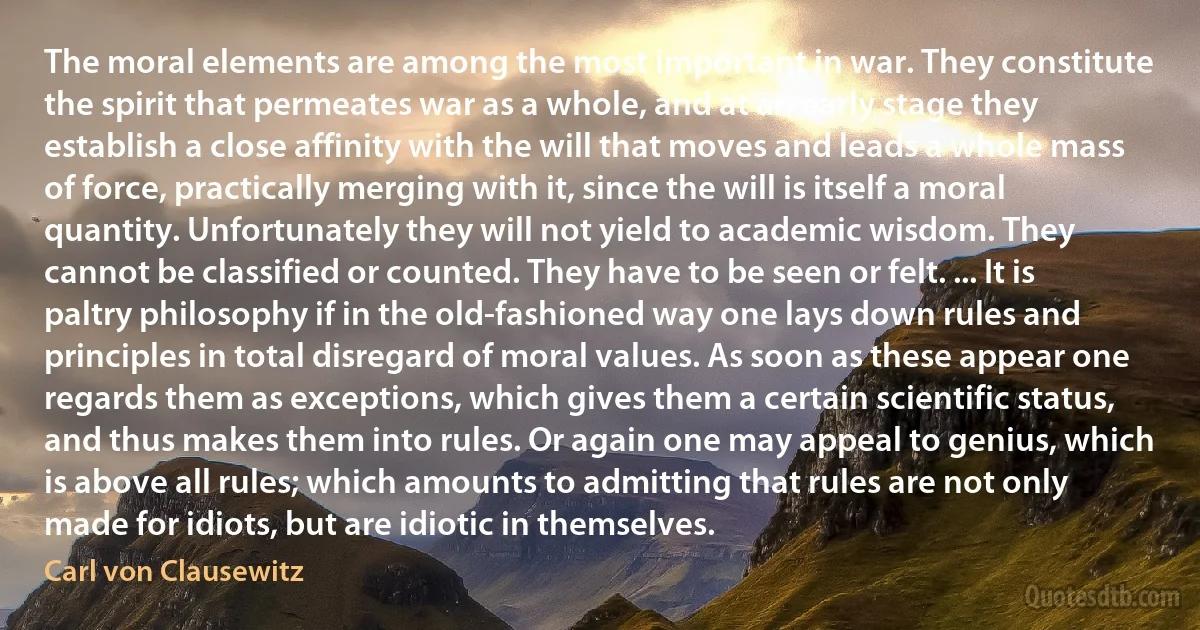Admitting Quotes - page 3
Deep-seated preferences cannot be argued about - you cannot argue a man into liking a glass of beer - and therefore, when differences are sufficiently far reaching, we try to kill the other man rather than let him have his way. But that is perfectly consistent with admitting that, so far as appears, his grounds are just as good as ours.

Oliver Wendell Holmes Jr.
As for silver, I never could see any degree of fire make it part with any of its three principles. ...But admitting, that some parts of the silver were driven away by the violence of the fire, what proof is there, that it was either the salt, the sulphur, or the mercury of the metal, and not rather a part of it homogeneous to what remained? for besides that the silver, that was left, seemed not sensibly altered, which probably would have appeared, had so much of any one of its principles been separated from it.

Robert Boyle
...by action on man all known force may be measured. Indeed, few men of science measured force in any other way. After once admitting that a straight line was the shortest distance between two points, no serious mathematician cared to deny anything that suited his convenience, and rejected no symbol, proved or unproveable, that helped him to accomplish work. The symbol was force, as a compass-needle or a triangle was force.

Henry Adams
Multiculturalism in Europe is dead in the water, as every recent election has shown. Even the politicians are admitting it now. Some people cling to the illusion of it still, the way the Soviets clung to the illusion of Communism, but it's over, and these show trials and violent street attacks are symptoms of its death throes. They're the desperate acts of desperate people who've totally lost their way. Criminalizing opinion is an open admission that lawmakers have lost control, and created a situation they can't handle. But that's what happens when the people are never asked for their opinion, and, when they give it, it's ignored.

Pat Condell
The object of this Essay is to explain as clearly as I am able grounds of an opinion which I have held from the very earliest period when I had formed any opinions at all on social political matters, and which, instead of being weakened or modified, has been constantly growing stronger by the progress reflection and the experience of life. That the principle which regulates the existing social relations between the two sexes - the legal subordination of one sex to the other - is wrong itself, and now one of the chief hindrances to human improvement; and that it ought to be replaced by a principle of perfect equality, admitting no power or privilege on the one side, nor disability on the other.

John Stuart Mill
That as the admission of States by Congress under the constitution was an act of legislation, and in the nature of a contract or compact between the States admitted and the others admitting, why should not this contract or compact be regarded as of like character with all other civil contracts liable to be rescinded by mutual agreement of both parties? The seceding States have rescinded it on their part, they have resumed their sovereignty. Why cannot the whole question be settled, if the north desire peace, simply by the Congress, in both branches, with the concurrence of the President, giving their consent to the separation, and a recognition of our independence?

Alexander H. Stephens
It is said that within the council chamber the judges were naturally leaning toward acquittal. It becomes clear why, at that point, as justification for the verdict, it became vitally important to turn up some damning evidence, a secret document that, like God, could not be shown, but which explained everything, and was invisible, unknowable, and incontrovertible. I deny the existence of that document.... a document concerning national defense that could not be produced without sparking an immediate declaration of war tomorrow? No! No! It is a lie, all the more odious and cynical in that its perpetrators are getting off free without even admitting it. They stirred up all of France, they hid behind the understandable commotion they had set off, they sealed their lips while troubling our hearts and perverting our spirit. I know of no greater crime against the state.

Émile Zola
I suppose I ought to think up some dramatic, quotable phrase for Public Information and the history books, but I'm damned if any of them come to mind. Besides, admitting the truth wouldn't sound too good (...) The truth, Russell, is that now the moment's here, I'm scared shitless. Somehow I don't think even Public Information could turn that into good copy.

David Weber
This [article] doesn't mean that I actually want to be Lara Croft. In writing this I'm not admitting that I occasionally dress up in a tight top and khaki hotpants and prance around pointing two hairdryers at my dog. In this little article I am pointing out why, if you happen to be Lara Croft, that you should be very pleased with yourself.

Ben Croshaw
Let us... be careful of admitting into our souls the notion that there is no truth or health or soundness in any arguments at all; but let us rather say that there is as yet no health in us, and that we must quit ourselves like men and do our best to gain health-you and all other men with a view to the whole of your future life, and I myself with a view to death.

Socrates
Absolute greatness will never be great and also small, but that greatness in us or in the concrete will never admit the small or admit of even being exceeded; instead of this, one of two things will happen-either the greater will fly and retire before the opposite, which is the less, or the advance of the less will cease to exist; but will not, if allowing or admitting smallness, be changed by that...nor can any other opposite which remains the same ever be or become its own opposite, but either passes away or perishes in the change.

Socrates
Indeed I reply in a single word to the sentiments of the saints on these questions about nature; in theology, to be sure, the force of authorities is to be weighed, in philosophy, however, that of causes. Therefore, a saint is Lactantius, who denied the rotundity of the earth; a saint is Augustine, who, admitting the rotundity, yet denied the antipodes; worthy of sainthood is the dutiful performance of moderns who, admitting the meagreness of the earth, yet deny its motion. But truth is more saintly for me, who demonstrate by philosophy, without violating my due respect for the doctors of the church, that the earth is both round and inhabited at the antipodes, and of the most despicable size, and finally is moved among the stars.

Johannes Kepler



